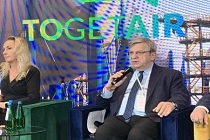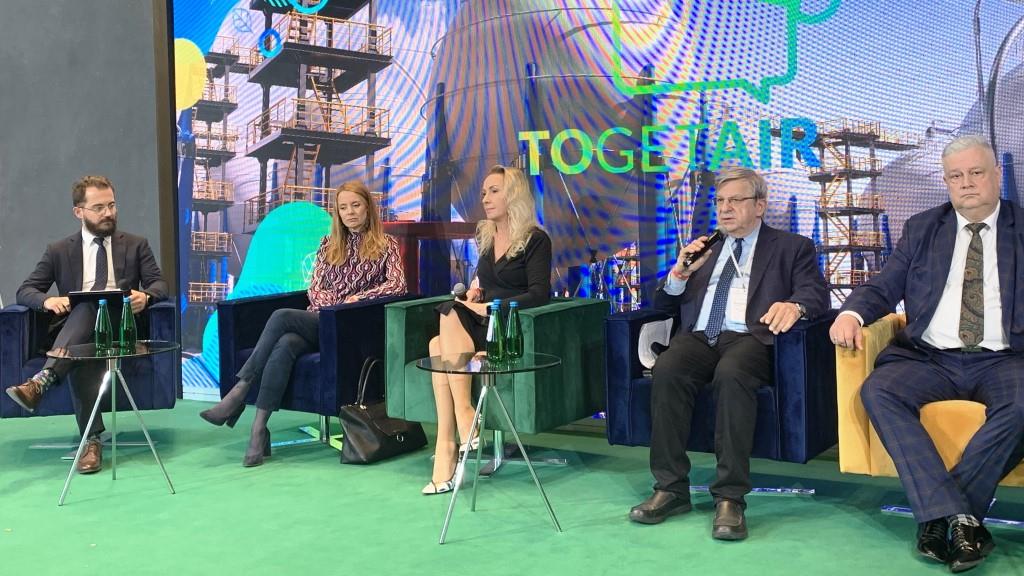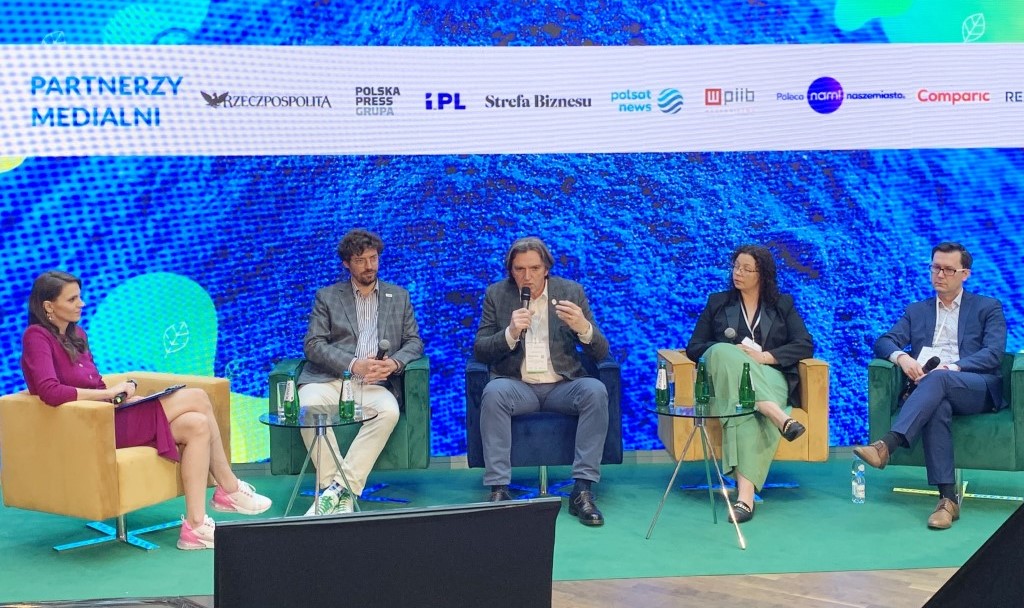 The TOGETAIR 2024 Climate Summit, which was organised by the Clean Air Foundation for the fifth time, has come to an end. The conference is held every year around International Earth Day.
The TOGETAIR 2024 Climate Summit, which was organised by the Clean Air Foundation for the fifth time, has come to an end. The conference is held every year around International Earth Day.
In this edition, the panel discussions included representatives of the Polish Geological Institute - National Research Institute: director prof. dr hab. Krzysztof Szamałek and dr Sławomir Mazurek, head of the Raw Materials Policy Laboratory. The event took place on 22-23 April 2024 in Warsaw, Poland.
PGI-NRI Director prof. dr hab. Krzysztof Szamałek was a participant on the panel entitled “Hydrogen and Renewable Energy Sources. Changing the investment model. The future starts now”. The moderator began the discussion by getting the participants to formulate a slogan definition of the hydrogen economy. According to them: "hydrogen is a currency that we cannot feel or see, and it is our future", "hydrogen is a complementary energy to existing sources", "it is the economy of the future that will permeate all areas of the economy and an opportunity for the country.", "it is a method to reduce global warming". This verbal experiment proved that, on the one hand, everyone agrees on the relevance of the development of hydrogen energy storage and, on the other, points out the benefits of their use.

In the discussion, it was pointed out that in a crisis situation, the hydrogen economy is the only technology that allows diversification of energy sources. Hydrogen storage facilities, unlike volatile renewable energy, offer up to four months' security when the energy supply chain is interrupted.
- PGI is anticipating the demand and possible future consumption of hydrogen for power generation by conducting preliminary analyses of what is happening in this sector worldwide, said director K. Szamałek. - A case in point is France, where deposits of white hydrogen, i.e. found in the rock mass, have been discovered in a coalfield. As Poland has many coalfields, we are exchanging information with the French geological survey, asking what rationale and clues led to this discovery and we intend to apply them in Poland. We want to diagnose under what circumstances hydrogen builds up in industrial quantities. We are doing a search of archival material to select those sites where we would like to carry out verification studies.
- In 2010, in Poland we had 2 GW of installed renewable energy capacity in the electricity sector, and currently it is approximately 30 GW, i.e. 15 times more. Looking ahead to 2030, the ministry wants there to be more than 50 GW of it, said Łukasz Tomaszewski - a representative of the Ministry of Climate and Environment. - Hydrogen is expected to enable the decarbonisation process to be activated primarily in industry, heavy transport and, to some extent, heating, he added.
In the panel discussion “Rare earth elements, lithium, cobalt, base metals. How access to critical raw materials affects the economy" was attended by dr Sławomir Mazurek, head of the Raw Materials Policy Laboratory of PGI-NRI . The discussion was chaired by Agata Śmieja, President of the Clean Air Foundation - the organiser of TOGETAIR. The panellists agreed that critical raw materials are key to the development of the economy, finding extensive use in the production chains of many commodities used in everyday life, high-tech industries and infrastructure components enabling the energy transition. PGI-NRI is an institution that assists entrepreneurs who are ready to take the risk of investing in new deposits of raw materials.

- The task of the geological survey is not to document deposits, but to indicate places where, on the basis of geophysical, geochemical, drilling and other research, deposits of specific raw materials may be found, said dr S. Mazurek. - The rest should be up to the entrepreneurs. I kept a close eye on what investors would do after the transformation in 1989 and noticed that they all chose already proven and reliable sites rich in deposits. No one was interested in the locations of the projected resources.
In the published Critical Raw Materials Act, the European Union requires member states to prepare a National Critical Raw Materials Exploration Plan within a year. A specialist team has already been set up at PGI-NRI to develop this document. - This makes us very happy and we hope that since it is such an important document, funding for research will be found, added dr S. Mazurek. - We have agreed with the Ministry of Climate and Environment that we will create it by the end of this year to allow time for inter-ministerial agreement and sending it to Brussels.
- A good example of business involvement in the raw materials sourcing chain is the operation in Canada, the USA and Australia of small companies investing in the exploration of deposits or the reinterpretation of already known deposits and the search for new destinations for them, said Piotr Krzemiński, specialist in the exploration and sourcing of critical raw materials. - This gap in Poland can be filled by experienced foreign companies.
The problem of a shortage of new mining students at Polish universities was also discussed, as was the possible shortage, in the near future, of qualified staff for new mining investment projects. This is a result of the unfavourable reputation that has been created over the last decade for this industry sector.
Experts stressed that the energy transition does not mean the cessation of mineral extraction, but only an evolution based on a change in the type of minerals. Developments in technology have created the need for access to deposits of raw materials other than coal. It is therefore necessary to take care of the development of mining, because it is essential for the good functioning of the economy.
Each time, the TOGETAIR Climate Summit brings together leaders who care about making environmental change. The experts talked on three stages, which were given meaningful names: "Climat care", "Business Connect" and "Future Cooperation". The first discussed modern methods and strategies in climate policy making, the second focused on energy markets and the third looked at innovative technologies in addressing climate change. PGI-NRI appreciates the importance of the event and, through the participation of our experts, certainly contributed a lot of relevant information and data on the topics discussed. We look forward with hope to the next edition of the TOGETAIR Climate Summit.
Text: Artur Baranowski
Photos: Paweł Jaskóła














 PGI-NRI offer
PGI-NRI offer Mineral resources of Poland
Mineral resources of Poland  Oil and Gas in Poland
Oil and Gas in Poland 



 Subscribe to RSS Feed
Subscribe to RSS Feed